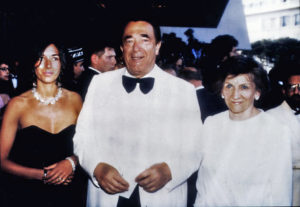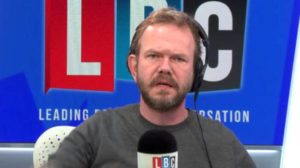Pride of place in my breakfast room in my home is a large sculpture that I commissioned to celebrate The Sun’s controversial Gotcha headline which followed the news that we had sunk the Argentine navy’s cruiser the General Belgrano.
I have never understood what the issue was with the headline. But then again, I don’t spend my time with Guardian readers or BBC news producers. Frankly, I didn’t care if the Belgrano had nosed into the exclusion zone or not. We needed to kill them before they killed us.
Simplistic, but I imagine the Ukrainians feel pretty much the same today.
To understand where that headline came from, you would have to be sitting in The Sun’s newsroom, back in the spring of 1982. Compared with today it was not just a different world but a different universe.
The fog of cigarette smoke had impregnated the walls, turning them a ghastly yellow. There was the reassuring clatter of typewriters proving the reporters were working. Phones were ringing. (What’s a phone, grandad?) Every time a phone rang there was a chance a reader had stumbled on a story that would bring down a politician or prove Jimmy Savile was a paedo. Those calls were gold-dust. There were plenty of them.
There was alcohol. The reporters would go out for a drink — but for the executives there was plenty of the stuff hidden away from Rupert Murdoch’s prying eyes. Although on one occasion, Murdoch dropped in unexpectedly on editor Sir Larry Lamb (my predecessor) and was “shocked” to see the amount of alcohol being consumed. “They’re drinking out of plant pots up there,” he said.
I remember going to one of Sir Larry’s afternoon conferences where it was clear he had been over-refreshing himself at lunchtime with a bottle or two of his favourite red. Surrounded by his acolytes at his desk (including me) he would, under normal circumstances, pick the story of the day and then hand draw Page One, complete with headline, on a blank piece of paper. Having created his masterpiece, Sir Larry would then pass the paper to the Night Editor who would take it back to the art desk to make it look good.
Because he was pissed, Sir Larry didn’t draw on the blank page but on his blotting paper. There was silence as we watched this bizarre turn of events. Not realising he had missed the page entirely, Sir Larry then handed the blank page to the Night Editor who, being a brown-noser like me, said “Thank you Larry.”
Today’s HR wallahs (there are more of them than subs these days) would be flat-out with the goings on. There was the time one of the sports journalists returned to the office quite drunk around 4 o’clock in the afternoon, approached a female colleague and asked if it was true her husband was a doctor. When she said yes, he promptly unzipped himself and asked if he might be able to do something about this spot on his penis. Hard to believe, but when the management fired him, the journalists went on strike and eventually the chap was given his job back.
So that was The Sun, then.
It was also hugely successful. The paper was selling well over four million copies a day. Every day. The paper mattered. It had caught the riptide of the Thatcher revolution. Hostile to big state. Hostile to big unions. Pro flogging council houses. Pro big spending on the military.
Along came the Falklands War. There were two routes you could take. There was the Labour-supporting Daily Mirror position. Where is the Falklands? Is there a deal to be done? Can we fight the war without killing anybody?
Then there was The Sun‘s position. They started it, we shall finish it. Do it to them before they do it to us. The only good Argie was a dead Argie. I inherited that kind of view from my father who had spent five years in a Japanese PoW camp. I hesitate to think what he would make of me owning a Lexus.
At one stage, the Argentine military regime was offering what looked like faux peace talks. The Sun’s response came via the headline: STICK IT UP YOUR JUNTA. A classic, it became our catchphrase for the war.
We decided to put the whole paper on a war footing. News editor Tom Petrie became Commander Petrie for the duration. Reporters were given ranks from private to colonel. I stomped around the newsroom in sergeant major parody referring to colleagues as “horrible little people”.
We invited readers to sponsor Sidewinder missiles. Joyfully it was reported that a missile fired from HMS Invincible with the words “Up Yours Galtieri” (the name of the Junta leader) had brought down an Argentinian plane.
We invented “Sink the Argies” computer games and Page Three girls were given military themes; “All Shipshape and Bristols Fashion.” Upscale stuff. Private Eye produced a mock The Sun with the headline: Kill an Argie, win a Metro. Not a bad idea. At morning conference, we contemplated doing such a competition. Strangely wiser counsel prevailed. That wasn’t always the case.
The Sun journalists were a militant lot, and the day the Belgrano was sunk inevitably they were on strike. But the printers, a bolshie collection of overpaid and underworked half-wits, would allow me to produce the paper and turned a blind eye to a couple of execs giving assistance.
It must have been around 10 o’clock on that May evening, while sitting on the news desk with assistant editor Wendy Henry, when it was reported that the Belgrano had been sunk. Hit with two torpedoes fired by our submarine, the Conqueror.
On hearing the news Wendy, an excitable talent, shouted: Gotcha! With headlines I have always found that instinct trumps intelligence. So GOTCHA it was. But as the evening wore on there was a suggestion that all 1,095 Belgrano crew had died in the attack.
Even for a hard-bitten soul like me, that seemed an enormous number, and I changed the headline in later editions to: Did 1,095 Argies die? Murdoch didn’t agree with the change saying he thought it a good headline. In the event 368 died.
Six weeks later, the war had ended. As with Thatcher, the Falklands had been a great success for The Sun. The paper-buying public liked our coverage and rejected the Daily Mirror’s timorous approach. The circulation gap between us grew swiftly to over a million copies a day. The cash, in both sales and advertising, for Murdoch simply crashed through the front door.
So where is The Sun four decades later? The alcohol has gone. The typewriters have gone. The smoke has gone. And most important of all, the circulation has gone. The crying shame is that the collective power and voice of ambitious working-class readers has been lost.
True, The Sun‘s readers have social media, which to my mind is a joy. But the authority of a newspaper which could reach 12 million readers every day (that’s 12 million “likes”) has been lost for ever.
Supposing such a war happened now, what would the paper’s reaction be? Frankly there is an uncertain note on the trumpet. Even if the North Koreans took the Isle of Wight, I have my doubts they would get angry.
And does it matter what The Sun says in any event?
The paper sells around 500,000-600,000 a day. That’s a guess as Murdoch’s management at News UK refuses to disclose the numbers except to media buyers who in turn have to sign an NDA. It’s true they have a news website, but they try very hard not to cover stories which polarise opinions. They don’t want to upset anybody, which means they don’t please anybody either.
With the death of the print version of The Sun, goes the role of the editor. Clever, laugh-producing or ballsy Page One headlines don’t matter a fig in the online world. Nor does something called a news sense. There is now software which can change the running order of the site depending on the stories the reader is clicking on.
That all makes complete journalistic (and commercial) sense but sadly, from my perspective, it does mean goodbye to Gotcha and all that. Mind you, the Argies will be delighted.
Disclaimer
Some of the posts we share are controversial and we do not necessarily agree with them in the whole extend. Sometimes we agree with the content or part of it but we do not agree with the narration or language. Nevertheless we find them somehow interesting, valuable and/or informative or we share them, because we strongly believe in freedom of speech, free press and journalism. We strongly encourage you to have a critical approach to all the content, do your own research and analysis to build your own opinion.
We would be glad to have your feedback.
Source: UnHerd Read the original article here: https://unherd.com





